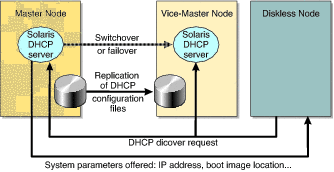| Netra™ High Availability Suite 3.0 1/08 Foundation Services Overview |
| C H A P T E R 7 |
The Reliable Boot Service uses the Dynamic Host Configuration Protocol (DHCP) service and the other services provided by the Foundation Services to ensure the boot of diskless nodes regardless of software or hardware failure. For information about how diskless nodes are booted and how they are allocated IP addresses, see the following sections:
In a Netra HA Suite cluster, diskless nodes rely on network services to boot their operating system and run their software. The Reliable Boot Service provides a standard DHCP server on each of the server nodes. The Reliable Boot Service keeps the DHCP service operational even after failover or switchover.
The DHCP servers use a public DHCP module that is configured by the DHCP administration utilities dhcpconfig, pntadm, and dhtadm. For information about these utilities, see their man pages.
By default, the DHCP configuration files are stored on the master node. They are mounted on a mirrored file system and replicated on the vice-master node by the Reliable File Service. For information about the Reliable File Service, see Chapter 6.
You can also put the DHCP configuration files locally on the master node and copy them to the vice-master node. For information on putting DHCP configuration files locally, see the nhfs.conf4 man page.
The DHCP service provides several methods of allocating IP addresses to diskless nodes at boot.
The DHCP daemon is started under the control of the Daemon Monitor. If the Reliable Boot Service fails, the Daemon Monitor takes the recovery action described in the nhpmd1M man page.
For further information about DHCP in the Solaris Operating System, see the Solaris DHCP Service Developer's Guide.
FIGURE 7-1 shows the Reliable Boot Service on the master node and vice-master node, and the request for boot from a diskless node. The diskless node broadcasts a DHCP discover request to the DHCP servers on the server nodes. Only the master node responds to the DHCP discover request. After failover or switchover, the boot server on the new master node responds to the DHCP requests from diskless nodes.

The Reliable Boot Service is notified by the Cluster Membership Manager when a new master node is elected, or when a node joins or leaves the cluster.
When a diskless node boots, the Reliable Boot Service assigns an IP address to it. If the node does not boot successfully within a specific time period, the Reliable Boot Service frees the allocated resources for the node. When a node leaves the cluster, the Reliable Boot Service retrieves the IP address that was being used by the node and clears the associated entry in the DHCP configuration files.
The method of booting diskless nodes at cluster startup is called the boot policy. There are advantages and disadvantages to each of the boot policies. Your choice depends on the hardware configuration of your cluster. For information about how to configure a boot policy, see the Netra High Availability Suite 3.0 1/08 Foundation Services Manual Installation Guide for the Solaris OS. This section describes the boot policies used by the Foundation Services.
This boot policy maps the Ethernet address of a diskless node to a fixed IP address.
This system has the advantage of statically dedicating IP addresses to specific machines, making it possible to attribute groups of software to specific machines. However, this system does not support hardware hot-swap. Furthermore, when a node fails, the Ethernet address to IP address mapping remains assigned and cannot be reused.
Copyright © 2008, Sun Microsystems, Inc. All rights reserved.